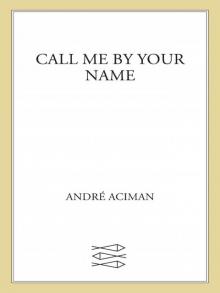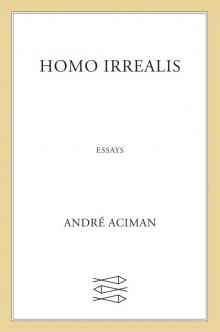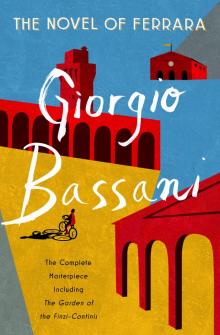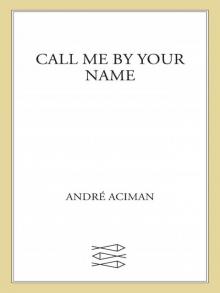- Home
- André Aciman
False Papers Page 3
False Papers Read online
Page 3
Yet this twenty-minute view, interrupted and obstructed as it was, remained the most beautiful thing I had ever seen. What made it so spellbinding might have been leaving Italy, which I disliked in those days, or the joy of going to Paris, where everyone said we would eventually move. Or perhaps it was simply the oncefamiliar, ordinary pleasure—now a luxury—of having a prolonged view, however imperfect, of the sea. For an Alexandrian, used to having the beach within sight all day long, it was like meeting a close sibling two years after a quarrel: an odd mix of strained familiarity, sudden intimacy, and wistful reminders that, despite embraces, things might never be the same.
Not that I hadn’t seen the beach in Italy before. But this was different. This had timelessness, magnitude, spirituality—not the attraction of an exalted swimming pool, which was what the beaches of Rome held for me. This was the beach year-round: beach as a way of life, beach at hand’s reach, beach in the blood. Just as in Alexandria. Passing by so extended a seascape was like passing by Alexandria, the way we do in dreams, waving hello to a house that is no longer ours, that belongs to others but might revert to us any moment now, because the universe would make so much sense if it indeed did. It made me remember beach life more keenly, made me long for it, made me know exactly what I could almost touch, and lacked, and might cry for. That, after all, was why it was so beautiful—because it was familiar, because I had finally found it again, because I had become a stranger to it, because it was made to be lost. Losing the sea was already embedded in every image of the sea. You look at it because it isn’t, and could never be, really there; because it wasn’t yours, and would never be yours again.
What broke the spell—or rather, what magnified it—was the fact that during a brief trip I took fifteen years later, a girl and I, armed with Eurailpasses, having sped by this selfsame spot and having decided that this was perhaps the most perfect place in the world, suddenly got off the train a few stations later, at Nervi. Neither of us had heard of the town. We didn’t have hotel reservations. It was ten o’clock at night. And it was raining. But we did not feel that the situation could turn against us. We asked a cabdriver to take us to the best hotel, assuming that such a hotel would offer the most spectacular view of the sea, all the while fearing that the rooms would be taken. When we arrived, I got out of the cab, told the driver not to turn off his engine—a propitiatory gesture—and rushed in to ask what I expected to be a perfunctory question about vacancies. The answer surprised me. Yes, they did have rooms. With a view? Naturally, signore. Balcony as well? How else? Ten minutes later we were sitting on a balcony overlooking the poorly lit cliffs of Nervi and Bogliasco, watching the raging waves crash against the rocks at night, as in any Romantic poem.
The next morning, when we awoke and opened the French windows, I found what I feared I would never find again in my life. Let me correct myself: I found what I feared I would find but could never afford to hope I might find and, indeed, continue to hope I’ll never find again—because I wouldn’t know what to do with it, because losing the sea makes living in New York easier to accept, because I want to take the sea on my terms, not on hers, because I want it all or nothing, knowing full well that ultimatums with people, much less with the sea, are intentionally unacceptable.
What I found that morning was perfect swimming weather, perfect blue sea, perfect blue sky, perfect breakfast delivered to our perfect little room and consumed on the most perfect little table on the most perfect balcony. After swimming, it was back to the balcony. After lunch, back to the balcony. After a long nap, back to the balcony. Not much time for sightseeing. There was nothing to see in Nervi. I took out my diary and, feeling quite inspired, could write only the following terribly humbling words:
E di tutto questo mare, cosa faccio?
It is impossible to translate what these words mean. First, because I’m not so sure they mean anything in proper Italian. But let me attempt to render them thus: “And what am I to do with all this water?” It was an expression of helplessness before overwhelming bounty. It’s what you say when you’ve been given a huge, unwieldy present that you’re unable (or reluctant) to accept—a carton of books, a huge box of chocolates, or even a second life, complete with childhood and adolescence all over again. Or it’s like having a huge dessert heaped on your plate as you think to yourself with greed and gratitude and no few misgivings: Am I really expected to finish all of this? Wouldn’t you like to take some back? I am not used to so much. Must I eat it all now? Can I take some home? How do I live this down? Can’t you make it go away?
It almost sounded as if I had been.. inconvenienced. Instead of being enthralled by the sight, instead of expressing great joy at finally being in this very spot which years earlier had reminded me of an Alexandria-done-better, the words that came to me were almost a lament, a whine. I might as well have been complaining. I was so used to deferral and denial that when confronted with plenitude, I caught myself wishing it had never existed.
Perhaps my seeming nonchalance or disappointment came from something too frontal, too invasive, too munificent in the spectacle. I wanted it more diluted, more fragmented, oblique, obstructed—as it had been on my train rides to Paris so many years earlier—even though it was precisely this fragmented nature of the vista that I used to find so irksome and frustrating. Sitting on my balcony, I kept staring at the fabulous expanse of blue, and all I could think of, besides feeling helpless, was: There it is. I’m leaving in three days! I wanted to close my eyes. I was in the most perfect spot on earth. There was, now that I think of it, nothing more to want. Nothing more to say.
But that was the problem. There was nothing to write about, nothing to invoke—nothing was happening. Everything I knew how to do proved, on this occasion, quite useless. There was, to use a current term, no narrative.
Thinking—as any bookish man is always reminded when confronted by the hard-and-fast business of life, of the body, of pleasure—comes after, not before, and certainly not during. To the question “What am I to do with all this water?” the answer should have been “Swim”
Never in my life had I been served such a huge dish and been left feeling so hungry, so worried. Like a rich immigrant who comes back to his little native town hoping to impress the locals but finds that if he fails to recognize them, they couldn’t care less that he hasn’t, I didn’t even know what to feel, much less what I felt, except for this admixture of numbness and joy. I finally decided to publish these words in a memoir: “All this sky and all this water—what do you do with so much blue once you’ve seen it?” The words were not so much a question as a statement of despair, of defeat, of profound irony. It was just a question—to which I knew there was no answer.
What do you do with so much blue once you’ve seen it? meant: I cannot touch any of it—just look and be glad I saw. But can one just stand and stare and leave things alone that way?
What do you do with so much blue once you’ve seen it? meant: How do I take this stunning expanse back to America? And why, why be so tempted now that I’ve made my peace with America? Isn’t it pointless to be given this blue, which I love so much but which I’ve grown to love if for no other reason than because I’ve allowed myself to think it could exist only in memory and is therefore unreal?
What do you do with so much blue once you’ve seen it? came almost as a reproach, as though I were misexperiencing the sea in the same way, as an adolescent in Egypt, I never wanted to go to the beach for fear of running into those I was dying to meet and pretended to avoid and hoped they’d ask me why.
What do you do with so much blue once you’ve seen it? What is it if not the desire to prod some kind of admission from those we cannot have and wish we hadn’t met or gotten to love and are condemned to crave.
What do you do with so much blue once you’ve seen it? It’s what you ask instead of doing, as if words could provide anything over and above raw experience.
My love of the sea is in part a result of having lost Alexandria, no
t necessarily something I experienced in Alexandria. I love it precisely because it was lost. The smell of salt, the touch of sunlight on bare skin, and above all the magic of beach life, with its strange, elaborate rituals.
One might as well ask: When, in fact, did I learn to worship the sea?
When, for instance, did I learn to decipher those imperceptible signals by which, while you’re still in bed with your eyes closed, you’re already able to determine whether there’s a white flag, or a red flag, or no flag at all along the beaches?
When did I discover the magic sensation of walking toward the beach without being able to spot the beach yet, and, like all born Alexandrians and seasoned beachgoers who are superstitious, when did I learn to look the other way, if only to pretend I didn’t know I was in fact headed to this one place that gives me so much pleasure?
When did I discover the mild anxiety, the légère angoisse, of walking toward the beach and catching myself feeling something which, many years later, I realized—probably with the feeling that I might not have overcome it as an adult—was a sense of apprehension and dismay caused by the image of girls upon the beaches, desirable and disturbing, on whose bodies still hovers my fear of desiring, or of desiring too much, or of being snubbed for desiring?
Where did I learn to love the beach at seven o’clock in the morning, or just before noontime, or immediately after lunch, or late in the afternoon, when after swimming for the second time that day one takes a shower and is then greeted by the cool, crisp feel of a clean-scented cotton shirt? Or the pleasure of drying in the sun and hearing friends’ voices drifting in and out of what must surely have been, although one keeps swearing it wasn’t, a short, unintended nap? There were days when, taking finals in late spring, I would look out the window and suddenly know that this day had beach weather written all over it, that I could almost touch the blueness, although the beaches were nowhere within sight or hearing.
Drop me in Nice or in Anzio or in East Hampton as someone’s guest and early on Sunday morning I will look for any excuse to go out to buy the paper and take the long way, not because I need to read the paper or because I need to be alone, but because I want to take time out and think that I am going on a very familiar errand, that I know exactly what I’m doing, and that any moment now I’ll end up pushing open a very old gate whose squeak I can’t forget. As long as I keep expecting to arrive there and never really hurry back, I will, if I try hard enough, make out the voices of people who have long since died but have suddenly come back and are beginning to complain that I’ve been gone too long and have almost missed breakfast.
If I long for the sea or for Alexandria, it is because, with the sea around me, I can begin to rebuild my life, put things back together again, pick up where I believe I left off. I collate little snippets of the past, the way those who’ve been deported map out every corner of their city, their street, their temple.
I look for the sea everywhere, because the sea was the backdrop for almost all the scenes of my childhood. I look for my childhood, for my own gaze looking out at the sea. What I want is not to swim but to have the pleasure of “finding the sea,” of guessing and spying the sea, of suggesting the sea, the way children today play at “finding Waldo”—because in finding the sea I find myself.
Anyone who was born on the Mediterranean—and I’m thinking not so much of beach resorts as of water cities such as Algiers, Marseilles, Naples, Trieste, Istanbul, Beirut, Alexandria—has an internal compass that immediately detects the presence of water nearby: thalassotropism. You turn to water. You’re alerted neither by smell nor by sounds but by an intense silence, the kind that sits heavily before a late-afternoon snowstorm in other cities—a hollow, airy, unobtrusive silence in which loud noises are instantly muffled by what could only be the quiet sea. Even when you’re in a big city, your senses immediately warn you that if you thread your way through the narrowest streets, you’ll eventually be led to this dazzling expanse of turquoise and aquamarine.
If I pretend not to notice the sea when I approach it, it is not simply to intensify the pleasure by wedging endless interruptions and intrusions along the way. I go looking for snatches, swatches of blue, not vistas, because people who’ve lived in water cities see the sea every day but seldom focus their entire attention on it. It is by ignoring the sea, or by re-creating the nonchalance with which I used to ignore the sea, that the sea comes alive for me today. Even my reluctance to go for a swim twice on the same day now becomes the surest reminder of my love for the sea.
It is when I am almost blinded by light in New York City that I remember the sea on glary sunny days. It is by not looking, which is what one did in Alexandria, that I can give myself the surest impression that the sea might just as easily be waiting across the street. I do not look because I do not want to find that I am wrong. I do not look because I am trying to bring about what I am cautious not to claim I want.
That, in the end, is how I love the sea. I love it from across the street. I need distance, obstacles between me and what I want. I like bits and pieces of the beach—even symbols, signs, tokens, totems, fetishes of the beach—the way I like the promise of Paris more than Paris itself, a staggered view more than huge vistas.
I need all these dilatory measures the way Matisse needed them when he painted in Nice. There are almost no paintings with the word “sea” in the works Matisse did in Nice between 1916 and 1930, especially those done at the Hôtel Méditerranée et de la Côte d’Azur. Interior with a Violin Case, Interior with a Black Notebook, Woman with a Green Parasol on a Balcony, Woman with a Pink Parasol on a Balcony, Pascal’s Pensées, The Closed Window: most show a room leading to another room, which leads to yet another, until you reach a faraway window. Some of these paintings, however, depict a room that leads directly to French windows opening onto a balcony, in between the balusters of which finally appear what lies—for me—at the very core of these paintings: incidental patches of blue, caught almost inadvertently or as an afterthought by the painter, who seems to have merely dabbed a few strokes of paint between each post. Advertisers have seen through the trick: airlines, travel agencies, department stores, and manufacturers of cigarettes, perfume, lingerie, soaps, suntan lotion—all have reinvented the magic resonance of that blue space caught between curved balusters.
Sometimes in Matisse you do not see the balcony or the banister. Instead, the shutters are closed and the room is quite dark. Even so, the slats in the shutters cannot quite belie the explosion of noon light downstairs on the Promenade des Anglais. In the darkened interior of The Hindu Pose, for example, behind a barechested woman, the most exiguous crack in between the shutters immediately betrays the intensity of summer light in Nice. It may seem that the opened violin case, or the woman with a pink umbrella, or the black mirror placed behind a bowl of sea anemones reflecting a side view of the painter’s bed is the true subject of Matisse’s eye: in fact, his subject was always the sea. But staggered, deferred, delayed, distanced, recessed, almost serving as a vague background hastily sketched around a precisely executed balustrade and allegedly having no other purpose than to add color to what would have been a stifling scene in a room.
Of course, when I look at these paintings, especially those of 1919, and that room I seem to know as well as my own, I am looking at them as a lover of lost beaches looks at someone else’s love of sea color. I want to go to that room because I want to see the place from which Matisse did the one thing every artist is interested in doing with the sea: not to describe it, not even to evoke it, but to invoke it. I want to see the room in which he purposely cultivated the distance between himself and the sea, distracting his gaze, throwing all kinds of objects upon his field of vision as though they were hurdles, placing other rooms and all manner of draperies between his easel and the sea, because now I, too, want to do the same with the sea, the way scholars put a footnote between their subject matter and their love for it. I will visit his hotel bedroom one day, throw open the window shutters th
e way hotel personnel do after depositing your bags, and staring out to the sea, rather than watch my thoughts drift onto this vast expanse of blue, I will remember that this is a visit to the French window from which Matisse himself might have said, “What do you do with so much blue once you’ve seen it?” And as I stand there trying to perform the solemn act called “taking it all in,” thinking of Nice and the years that have passed between 1919 and 1999, and the sea that allows me to look out into the deep and imagine the vaguest outline of the Eastern Harbor of Alexandria farther out, I know that I will catch myself thinking of the black violin case with the balusters and the ray of light sweeping the floor of Matisse’s bedroom. Except that I won’t be thinking of this room in Nice but of a picture of it on West Fifty-third Street in Manhattan, at the Museum of Modern Art. I will need this new detour, this new obstacle between me and the sea. Except that the obstacle will now be the painting itself.
Monet must have known this, too. There are scenes of Bordighera, where, standing on top of a hill, Monet would paint a rather gnarled, detailed, scrawny set of pine trees with surrounding foliage; but I suspect that it is the restrained spread of blue in between and above the busy foliage that truly matters, the background that is truly the foreground—the light from the sea, the light-because-of-the-sea that Monet wanted and that Proust so beautifully rendered as the “sun beaming on the sea.” The tree stands before us, and downhill lies the town of Bordighera. In fact, from his visit to Bordighera, it seems that Monet painted only one direct seafront, The Marina in Bordighera, a rather uninteresting painting. Otherwise, he seems to have avoided all direct contact with the sea. What Monet left us, instead, are collections of scenes of Bordighera: the Moreno gardens, for example, with their lush palm trees, the tufted growth granting but the most meager peek at this distant, immaterial blue—your eyes forced to reach out and find the sea, the way Proust’s plante grimpante seeks out its object of desire. Sometimes there isn’t even a hint of water. Monet, who had written to his wife about “water, beautiful blue water,” abstained from painting any water whatsoever. Waterless seascapes.

 False Papers
False Papers Harvard Square
Harvard Square Alibis
Alibis Find Me
Find Me Call Me by Your Name
Call Me by Your Name Out of Egypt: A Memoir
Out of Egypt: A Memoir Enigma Variations
Enigma Variations Homo Irrealis
Homo Irrealis Eight White Nights
Eight White Nights Out of Egypt
Out of Egypt The Novel of Ferrara
The Novel of Ferrara Harvard Square: A Novel
Harvard Square: A Novel Call Me by Your Name: A Novel
Call Me by Your Name: A Novel